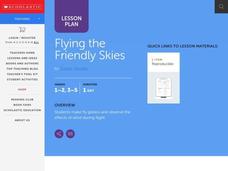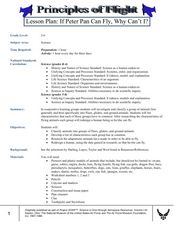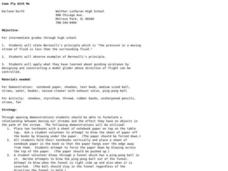NASA
Space Shuttle Glider
Your charges will enjoy putting together this model of the space shuttle and completing the three challenge activities described in the lesson. The worksheets embedded in the plan that pupils use to cut out their gliders are beautifully...
Teach Engineering
Balsa Glider Competition
Change one variable and try again. Teams build basic balsa gliders and collect data on their flight distances and times. Through collaboration, the team decides on two modifications to make to the basic design and collect data for the...
NASA
The X-1 Paper Glider Kit
After reading an interesting account of how the X-1 aircraft was designed, built, and utilized, young engineers try their hand at constructing a paper glider version of the airplane. They cut out the plane out of a nicely designed...
Curated OER
Building Vocabulary with Model Airplanes
Your class can build new vocabulary while they study aircraft terminology. In order to work around pilot when they are on the flight line, learners build a model airplane applying the new vocabulary as they go. This hands-on real life...
Curated OER
Flying the Friendly Skies
Students discover the power of wind by flying a glider. In this weather lesson, students describe their thoughts on wind and practice using weather related vocabulary. Students construct model gliders in class and attempt to fly them...
Teach Engineering
Better By Design
Which modification is the best? Using the scientific method, pairs determine the effects of each control surface on the distance of a glider's flight. The activity, section 16 in a 22-part unit on aviation, allows pupils to gain a better...
Teach Engineering
Will It Fly?
Go fly a kite, then fly a plane! The 19th part of a 22-part unit on aviation looks at the way kites and gliders help aid in the understanding of flight. Pupils discuss how engineers used kites to influence airplane designs.
Curated OER
Forces, Controls And Aircraft Systems
Pupils are introduced to the physics of flight through video and PowerPoint presentations. They construct and fly model gliders and compete for height, distance, time, etc.
Curated OER
Make a Model of a Wright Flyer
Students recreate a model of the 1903 Wright Flyer out of Styrofoam. Students practice following instructions, and discover information about the Wright brothers' engine-powered glider.
Curated OER
Drag Problem Set
Students read an explanation from a NASA Web-based textbook and then demonstrate an understanding of the text by applying it to calculating drag of both full-sized and model gliders.
Curated OER
Paper Gliders
Sixth graders study friction and drag. In this science lesson plan, 6th graders use different models of gliders and test to see which of the gliders fly the farthest. Students analyze their data and construct a graph.
Curated OER
Controlling Flight: Rudders, Ailerons, and Elevators
Fifth graders create paper gliders and check for flight distance and time. In this flight lesson, 5th graders create a paper glider from the attached worksheet and adjust the rudder, aileron, and elevator. They see how these adjustments...
Curated OER
Lift and Drag: Principles of Flight and the Soaring Imagination
Students construct models of early gas balloons and gliders. In this balloon and glider lesson, students create models of early gas balloons and gliders, discover how the forces of lift and drag effect aircraft in flight, and put on...
Curated OER
Flying The Friendly Skies
Learners investigate the science of flight while creating their own gliders and test them with the lift supplied by wind in the outdoors. They create a chart to make observations of the flight patterns of different gliders taking note of...
Teach Engineering
Building-Testing-Improving Paper Airplanes: Head's Up!
Take foldables to all new heights. Pupils build and fly different types of paper airplanes in the 14th portion of a 22-part unit on aviation. Groups collect data on distance and flight time for each plane and compare the data from the...
Curated OER
Flying the Friendly Skies
Students investigate aerodynamics by comparing and contrasting the flight of two gliders. They make prediction and observation charts and test a variety of hypotheses using paper gliders.
Curated OER
If Peter Pan Can Fly, Why Can't I?
Students redesign a human, using data in research, so that s/he can fly. In this flying lesson, students examine the characteristics and adaptations of groups of animals that can fly. Using this research, students work cooperatively to...
Curated OER
Bag Balloons
Learners demonstrate that heat can change air. They determine that hot air rises. Students construct a working model of a hot air balloon. They understand that there are two ways that a balloon can rise: it can (1) be filled with a...
Curated OER
Airplanes and Airports: How To Take Off Without Ever Leaving the Ground
Young scholars plan an airport visit. For this Airplanes and Airports lesson, students observe the people, activity, and machinery at airports. Then young scholars compare the characteristics of their observations at the airport....
Curated OER
Aerospace
Learners experiment with weight and balance of a glider. In this flight lesson students construct their own flying glider and record their experiment with it.
Curated OER
Come Fly With Me
Students apply the Bernoulli Principle. In this flight lesson, students design and test a glider.
Curated OER
100 Years of Flight
Students investigate Bernoulli's principle of air pressure and how it
relates to the lift of an airplane. Students identify various Aeronautical vocabulary terms. Students construct a paper glider and experiment with the control surfaces...
Curated OER
The Invention of the Airplane
Students explore the history of the airplane and the Wright brothers. For this aviation lesson students examine the Wright brothers stories and kites.
Curated OER
Indiana Ice Investigations
Fourth graders create a model of the formation of Indiana by glaciers. Working in groups with appropriate materials, they create a model documenting how glaciers moved through the land and formed the geological structure and land masses...

























